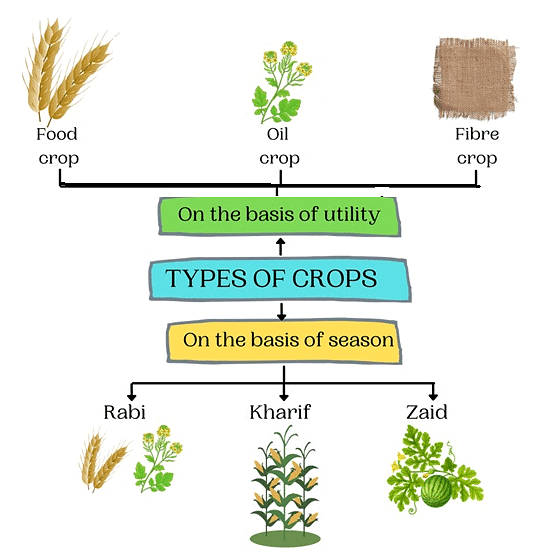Class 5 Exam > Class 5 Notes > Science Class 5 > Crops & their Safety
Crops & their Safety | Science Class 5 PDF Download
| Table of contents |

|
| Crops |

|
| Types of Crops |

|
| Essential Requirements to Produce a Good Crop |

|
| Crop Protection and Storage of Seeds |

|
Crops
- The plants that are grown in large areas during a particular period are called crops.
- Farmers work hard to plant seeds in the soil, water them, and take care of them until they grow into healthy crops.
- This practice of growing large quantities of plants for food and other purposes is called agriculture.

Types of Crops

- Based on Utility:
1. Food Crops (wheat, rice, potato, maize, sugarcane, etc,)
2. Oil-producing Crops (sunflower, mustard, etc.)
3. Fibre Crops (cotton, silk and jute) - Based on Seasons:
1. Kharif Crops
2. Rabi Crops
Rabi Crops
- In India, crops like wheat and gram are grown in the winter from November to April. They are called rabi crops.
- These crops do not depend on the monsoon.
- Vegetables like cabbage, cauliflower, pea and bean grow well in winters.
Kharif Crops
- Crops grown in summers from June to October are called kharif crops.
- Rice, maize, jowar and bajra are kharif crops.
- These crops depend largely on monsoon rains.
- Vegetables like pumpkin, brinjal and groundnut grow in summers.
Essential Requirements to Produce a Good Crop
1. Farmers should have knowledge about the soil, climate and season for growing different crops.
2. High Yielding Variety of seeds should be used. High Yielding Variety (HYV) seeds are special seeds that produce more crops than regular ones but need proper care, water, and fertilizers for the best results.
3. Farmers should properly irrigate the soil when required.
4. The right amount of fertilizers should be added to the soil.
- Fertilizers are substances added to the soil to provide nutrients that help plants grow better and healthier.
- Two kinds of fertilizers are used for this purpose: organic and inorganic fertilizers. Organic fertilizers are obtained from decaying plants, cow dung, etc, while inorganic fertilizers are synthesized. For, example, urea and nitrates.
 Spraying Fertilizers
Spraying Fertilizers
5. Farmers should use insecticides and pesticides to protect their crops from insects. However, overuse of pesticides can be harmful to the soil and ultimately to our health.
- Insecticides are chemicals used to kill or control insects that can harm crops and plants.
- Pesticides are chemicals used to control or kill pests, including insects, weeds, fungi, and rodents, to protect crops and plants.
Crop Protection and Storage of Seeds
For better and healthy crops, we must protect them. We should take the following steps to protect crops:

- We should protect the crops in the field against grazing animals like goats, cows and buffaloes by proper fencing.
- We should protect the crops against pests such as locusts, grasshoppers, caterpillars and diseases.
- Ripened crop should be harvested and stored properly as grains.
- Farmers should keep them safe from moisture and small animals. So, grains should be stored in air-tight containers.
The document Crops & their Safety | Science Class 5 is a part of the Class 5 Course Science Class 5.
All you need of Class 5 at this link: Class 5
|
43 videos|198 docs|45 tests
|
FAQs on Crops & their Safety - Science Class 5
| 1. What are the essential requirements for producing a good crop? |  |
Ans. The essential requirements for producing a good crop include crop protection and storage of seeds. Crop protection involves measures to prevent damage from pests, diseases, and weeds, while storage of seeds ensures their quality and viability for future planting.
| 2. How can crop protection be achieved? |  |
Ans. Crop protection can be achieved through various methods such as using pesticides or insecticides to control pests, employing crop rotation to prevent disease buildup, practicing good weed management, and implementing integrated pest management strategies.
| 3. Why is seed storage important for crop production? |  |
Ans. Seed storage is important for crop production because it ensures the availability of high-quality seeds for planting in the next season. Proper storage conditions help maintain seed viability and prevent deterioration, allowing farmers to have a consistent and reliable seed supply.
| 4. What are some common pests that can damage crops? |  |
Ans. Some common pests that can damage crops include insects like aphids, caterpillars, and beetles, as well as diseases caused by fungi, bacteria, and viruses. Weeds can also compete with crops for resources and hinder their growth.
| 5. What is integrated pest management? |  |
Ans. Integrated pest management (IPM) is a holistic approach to pest control that emphasizes the use of multiple strategies to manage pests effectively while minimizing the use of chemical pesticides. It involves monitoring pest populations, identifying their natural enemies, promoting beneficial insects, and using cultural and biological control methods alongside judicious pesticide use.

|
Explore Courses for Class 5 exam
|

|
Signup for Free!
Signup to see your scores go up within 7 days! Learn & Practice with 1000+ FREE Notes, Videos & Tests.
Related Searches


















